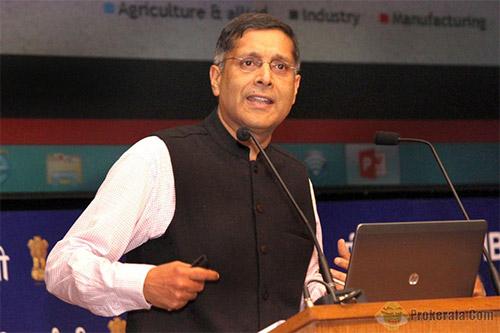Prospects brighten for key tax reform; Arvind Subramanian panel may suggest 18% GST rate
Dated 24th November, 2015
 A key panel on goods and services tax is likely to recommend a revenue-neutral rate of about 18 per cent. The group, headed by Chief Economic Adviser Arvind Subramanian, has zeroed in on the rate after considering various scenarios, brightening the chances for this important reform as the low rate should be acceptable to everyone.
A key panel on goods and services tax is likely to recommend a revenue-neutral rate of about 18 per cent. The group, headed by Chief Economic Adviser Arvind Subramanian, has zeroed in on the rate after considering various scenarios, brightening the chances for this important reform as the low rate should be acceptable to everyone.
"It has worked out to about 18 per cent," a government official privy to discussions said. Another official said the range for the tax could be 16-18 per cent.
GST, which seeks to replace a host of central and state indirect taxes on goods along with services tax, will create a pan-India market and is expected to help lift the country's gross domestic product (GDP) by 1-2 per cent.
A revenue-neutral rate means a rate at which there would be no revenue loss to the Centre or states under GST compared with current collections. Low rate will help boost compliance and also cut the pain from increase in tax rate on services, which is at 14 per cent. Under GST regime, tax on goods will come down substantially from 27 per cent now, but that on services will go up.
The government is also likely to look at two rates in services tax to lower the tax burden on essential services. The report of the Subramanian panel, based on latest data, is expected to be a key input in deciding the rates. Experts bat for a reasonable rate and a neat structure. "The rate in the range of 17-18 per cent is a welcome suggestion as any rate above this would not be desirable," said Anita Rastogi, partner-indirect tax at PwC. "Also, it is imperative that goods and services are not taxed at different rates or else it may not solve multiple issues currently being faced under indirect taxes, leading to double taxation."
A final call on the GST rate is to be taken by the GST council proposed in the constitution amendment Bill, which is stuck in Parliament with the main opposition party, Congress, refusing to back it in the Upper House where the ruling National Democratic Alliance does not have the required numbers. The government has reached out to Congress, but the Bill's passage in the winter session still remains uncertain. Congress wants the government to scrap the 1 per cent tax proposed for manufacturing states and cap the GST rate at 18 per cent in the constitution amendment Bill.
(This article is published in The Economic Times on 24 Nov, 2015)





